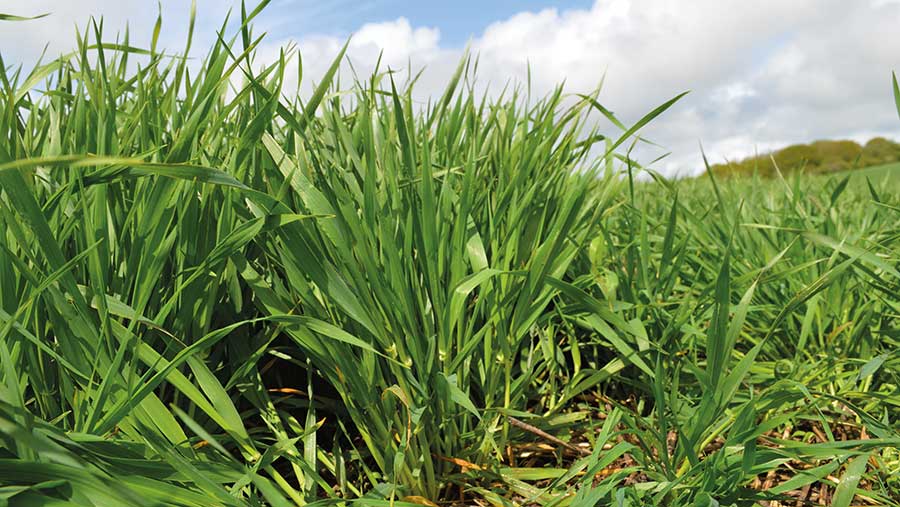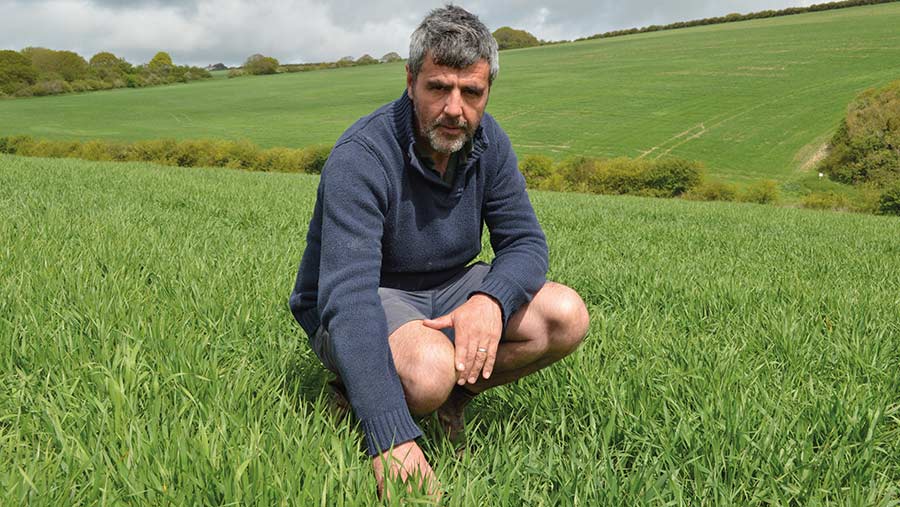Big brewer offers a premium for regen barley
 © MAG/David Jones
© MAG/David Jones Ben Taylor is growing spring malting barley for brewer Carlsberg which will earn him a price premium for following regenerative farming practices, such as growing cover crops and establishing a good rotation.
He was already fulfilling all the regen requirements of the Danish beermaker, so he signed up to grow 190ha of malting spring barley on the East Sussex estate, where he is farm manager, under a new Carlsberg regenerative barley contract.
See also: Yorkshire barley growers plan for zero-carbon beer
“It is nice to have an end-user acknowledging that regenerative agriculture has a value and is prepared to pay for it,” he tells Farmers Weekly.
Beer quality barley
From his past experience, the Null-Lux barley varieties demanded by Carlsberg have similar management demands to conventional ones, such as Planet, and yields to match.
Carlsberg has bred these spring barley varieties to give better quality and shelf life to its beers.
The brewer is offering a £5/t premium to grow Null-Lux varieties over the standard malting barley price, and then a £10/t premium on top of that to meet its regenerative agriculture standards.
Spring barley is a key crop on the mixed farming 1,200ha Iford Estate, just south of Lewes, and is generally the only spring crop in a rotation that includes milling winter wheat and oilseed rape on South Downs chalk-based light soils.
There is also a suckler cow herd grazing river meadows and cover crops on the Downs.
“We recognise that regenerative practices are good for the environment and we like to be growing crops that people really want to buy,” he adds.
Key principles
The brewer stipulates a number of regenerative farming principle in its new contract, which was launched for the first time this year:
- Rotation – Farms need to be growing at least three different crops in a five-year period. This is met, as the estate crops winter wheat, spring barley and oilseed rape.
- Cultivations – Fields are not to be cultivated to more than 100mm depth. Again this is met as the whole estate uses direct drilling.
- Cover crops – These are to be used before spring barley with a minimum of three species used, including one legume. The estate currently uses cover crops including stubble turnips, vetch, forage rape, buckwheat, phacelia and white clover. These are usually grazed off with the estate’s suckler cow herd.
- Inputs – There is an aim to reduce pesticide use by 5% every year. The estate is always looking to cut back on synthetic inputs.
- Soil testing – Use an N-min test over the winter to calculate the nitrogen available from the soil. This is already being done.
- Tissue testing – This test should be conducted in early June just before flag leaf emergence to assess nutrient levels in the crops. This is being done.
In addition, participating farms are asked to include two of the following criteria such as livestock grazing cover crops, the use where possible of organic manures, in-field diversity strips, the use of companion crops, and not baling straw.
The estate is at present following the first two, and others where practicable.
Variety switch
The farm has grown Null-Lux varieties in the past before it switched to growing Planet for three seasons.
It is now back growing the new Null-Lux variety CB Score, which is on the current AHDB Recommended List as a described variety with a fungicide-treated yield on 101%, compared with Planet on 98% and another popular spring malting variety, Laureate, on 103%.
The variety shows a good resistance rating of 7 for rhynchosporium, 9 for mildew and 5 for brown rust – similar to Laureate, but a touch better on rhynchosporium and mildew than Planet on a 1-9 scale where 1 is very susceptible and 9 represents good resistance.
The 190ha of spring barley this season was largely drilled in a dry spell in February with the farm’s Horsch Aviator 6m disc coulter direct drill at 350-400 seeds/sq m, and the farm’s standard rate of 150kg/ha of solid ammonium nitrate nitrogen applied – 50% in the seed-bed and the other 50% at the two- to three- leaf stage.
Last season, after the dry and mild winter of 2021-22, the nitrogen rate was reduced by 30-40kg/ha due to more mineralised nitrogen in the soil, but there has been no reduction this spring from the 150kg/ha standard level due to the very wet winter.

Ben Taylor © MAG/David Jones
Input levels
Spring barley crops on the estate can receive up to two herbicides for broad-leaved and grassweeds, two fungicides and a plant growth regulator when necessary, but these synthetic input levels are coming down due to dose reductions and different actives.
Last season, in the very dry spring the estate used Syrex (SDHI fluxapyroxad and strobilurin pyraclostrobin) plus multisite folpet at the T1 stage in late May and then Soratel (azole prothioconazole) at the T2 stage in mid-June for disease control.
The estate targets a yield of 7.5t/ha for its spring barley, but last season despite the dry spring, the Planet averaged nearly 8t/ha, and all met brewing grain nitrogen requirements.
The Null-Lux variety this season looks good despite the wet and cold spring and was only a bit behind where expected, in growth stage terms, in early May.
The 190ha is a key spring crop for the farm, allowing for a good rotation and the use of cover crops, and makes about three-quarters of the gross margin of the 320ha of milling winter wheat grown as a variety blend of Crusoe, Illustrious and Zyatt.
The estate’s oilseed rape area has been cut back to 160ha this season due to slug problems in the crop, and 90ha has been redrilled with spring-sown canary seed.
The estate is one of 23 farms which signed up to grow an estimated 7,000 tonnes of regenerative spring malting barley during 2023, contracted by Carlsberg Marston’s Brewing Company (CMBC) and grain trader ADM, in partnership with advisory and agronomy group Ceres Rural.
CMBC is a 60/40 brewing joint venture between Carlsberg and Marston’s formed in October 2020, and it is committed to using 100% regenerative barley for Carlsberg Danish Pilsner by 2027 and for all its beer brands by 2031.
This is part of a wider global aim as Carlsberg looks to buy 30% of its barley using regenerative agricultural practices by 2030, moving to 100% by 2040.

